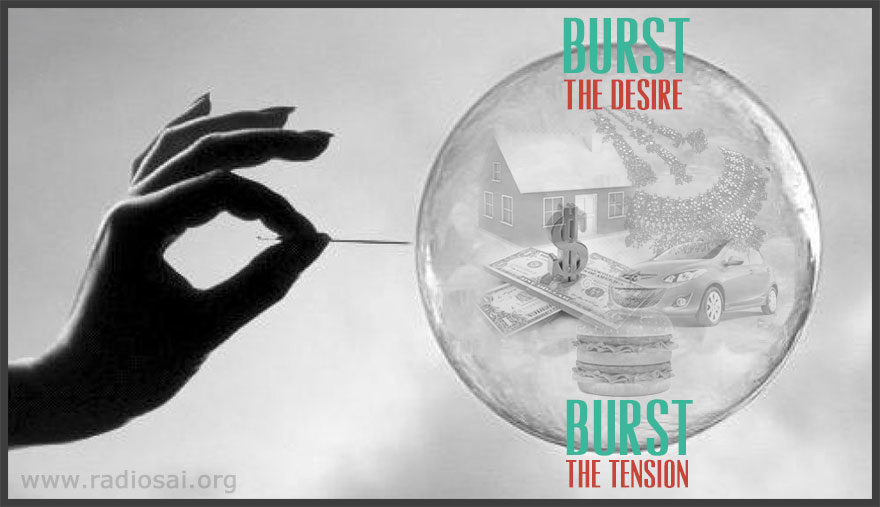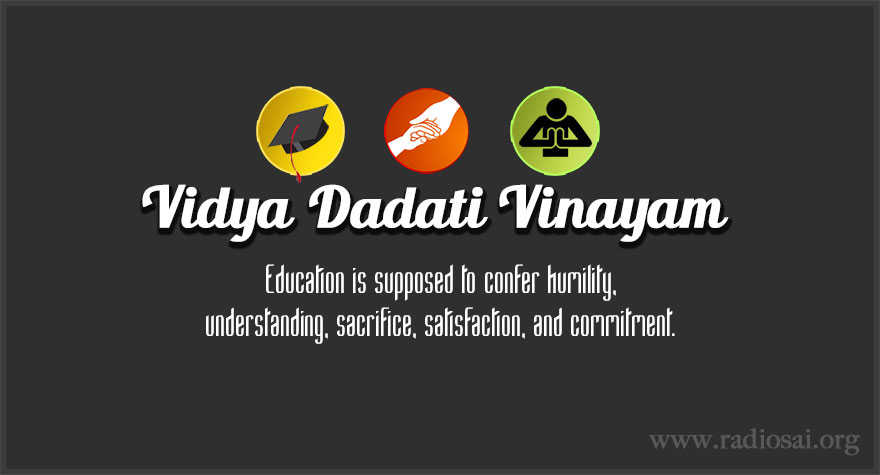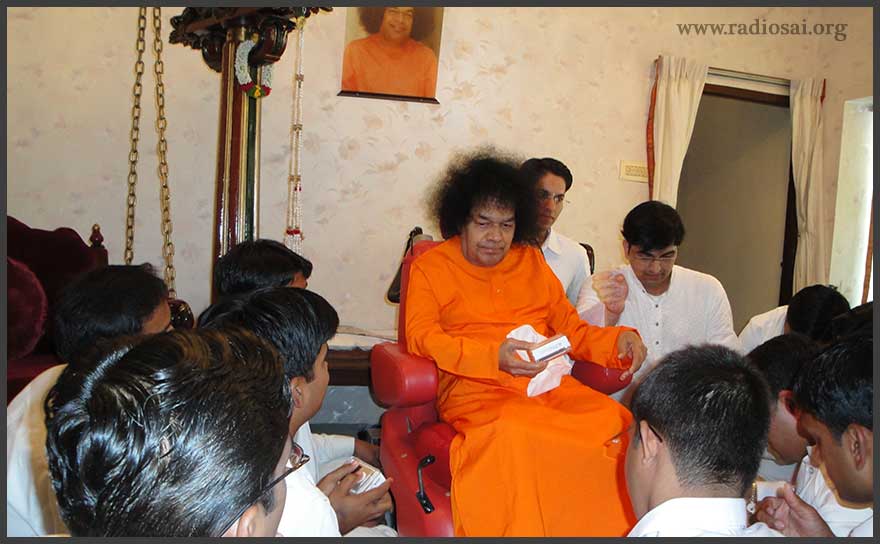|
|
| 'Like' us on Facebook | Follow us: |
Posted on: Oct 18, 2014
NATURAL CALAMITIES: WHO'S RESPONSIBLE?
- A Panel Discussion
PART 05
GS: If you are going to pack it with so many vehicles and buses, how will the village take it? Just as an individual cannot take it, a village also cannot take it.
KSM: Imagine the level of air and noise pollution if such a thing were to happen ever. It does happen on big occasions like Baba's birthday when we have so much of vehicular traffic. That's when we can't wait for those vehicles to go back so that our little paradise returns to normalcy.
GS: But that is only for a short while. It is Bhagawan Baba who is managing it. But today are you not killing cities like Bangalore, Madras, and Delhi?
KSM: Thirty years ago, Bangalore was such a beautiful garden city. Today it is a haphazard concrete jungle because of poor planning.
GS: Not only poor planning...but population explosion and explosion of vehicles.
KSM: A poor person wants to get a bicycle and then graduate to a two-wheeler, a motor cycle, a Nano, a Maruti and just keep going upwards to more expensive foreign cars.
 |
GS: We are adding not only to our problems but also to the national-level social problems. Social problems are horrible. Society is degenerating to such levels that you do not know whether your child is going to school or not.
KSM: And what that child is learning in the school apart from academics, because parents don't have time to see what their children are watching or what they have access to on computers. The net outcome is that children are exposed to material which is extremely inappropriate for their age, including watching cartoons as children.
A North American child by the age of five is exposed to several thousand murders because even in cartoons and video games, there are gun shots and there is killing and bloodshed. It is very hard for parents to pay attention to this aspect. They feel, “TV is a good baby sitter. While I am busy let the child watch a children's channel.” And even children's channels can be very unsuitable.
GS: That is the reason why the mind is getting more and more criminal.
What is the Way Out of this Vicious Cycle?
KSM: What is the solution to this current situation? We have already discussed and understood that there is uninhibited feeding of the senses with material which is inappropriate, which only feeds our desires. All of us are trying to live a life which we are not really ready for and is not necessary. It is based not only on our needs but also on our greed and desires. What did Baba provide as a solution to this?
GS: There are two things - one is the educational system that is established by Swami.
KSM: Baba said that the hospitals, the educational institutions and water projects were models which people were to replicate. He went ahead and created a perfect sustainable template to show how this can be done. But we are not finding too many takers for this outside of our institutions. People still want to go the other route and continue the greed drive because education has become edupreneurial - essentially a business.
GS: How long will we go on like this? There will be a point when you have to come back to normal and you will crash. If people want this kind of life, let them go on. A day will come when they will crash and will have to come back to normal.
KSM: That will be a very hard wake-up call.
GS: You have to pay a price.
KSM: We are already hitting the rock bottom.
 |
DA: Many corporations which were doing extremely well and regarded as idols in the corporate world have gone down the drain. But there are other examples I would like to bring attention to, not that we have only bad examples in corporate life. Today, corporations have got lot of power. In fact American politics and Indian politics to a large extent is influenced by the lobbying in the corporate world - it is a fact we all know. But there are many examples like Jamshedji's vision. He said the corporation does not exist to make profits from people. It exists only to serve people and the community.
I want to talk about these examples once again because all of us are either running institutions or working in an institution. We all have to go back and evaluate the working of the organisation and its net environmental impact. If it is not correct, we have to correct it. That is our moral responsibility in our own enlightened self-interest. We are not doing anybody a favour by saving the world or contributing towards it. It is our duty - the fundamental duty.
And I would like to give some more examples. Recently we were in the TVS Motor Company when we went for the industrial visit for the MBA boys. Mr. Venu Srinivasan was very proud to show us the bird sanctuary that exists in the very campus of TVS Motor Company; they are very environmentally conscious.
Look at General Electric, Walmart, Fraser Vineyard, and Patagonia. When the leaders of these organizations took decisions to be environmentally conscious even at a higher cost to the organization, people termed them as inept and called them as impractical solutions, but these people have stuck to their values. They understood that the whole organization is working in an environment which is governed by the natural environment. If we don't take care of the community, the society or the environment, we are sowing seeds of self-destruction.
KSM: So ecocentric leadership does work although it may take long to pay dividends.
DA: It may take a long time and may have a particular cost in the long run. Today, there are green funds in America. This means these funds only invest in those companies ...
KSM: Ethical funds.
DA: Yes. Ethical funds invest only in good companies. Having ecocentric leadership in the organization is a very profitable venture because today people have arisen to the reality that we have to support the cause of ecological sustenance some time or the other.
Self-Audit of Needs and Desires Need of the Hour
KSM: What about at a personal level, at an individual or a family level? What are some of the parameters that Baba gave us?
DA: I think one of the most important parameters is that we should not waste. Swami says, “For anything that your mind says it wants, please go back one step and ask yourself – ‘Do I really need it or not?’” ‘REALLY’ in big capitals. We may have a hundred pairs of clothes and we buy one more pair. Do we ask ourselves “Do I really need it?”
I have a small car but when my friend buys a bigger car, the joy I derive from my car goes for a toss. I say, “O God, he bought a better car.” and I am so jealous now. Somehow there is no cure for jealousy; it gets cumulative in geometric progression.
I have to ask myself, “Do I really need to sell my car and buy a bigger car now?” Everybody must question because wherever there is a big building, there is a pit somewhere beside; nothing comes free of cost.
GS: Talking about education, Swami once asked, “What is education?” “You are all Vidyarthis. What is the meaning of the term ‘Vidyarthi’? The person who is coming to seek education.” You get educated and derive the benefit. If you are here to have education and your mind is getting polluted then what is the purpose of education? In one context Swami made an observation and said, “Today the world is facing problems more because of educated people than illiterate people.” Illiterate people are not harming anybody; they are taking care of themselves.
KSM: We have learnt clever ways to harm others for self-serving purposes.
GS: If educated people do not understand the meaning of education, where do we all look to for solace? Education should give you fantastic qualities. It is said: ‘Vidya dadati vinayam’. 'Education is supposed to confer humility.' 'Education must confer some sense of understanding, sacrifice, satisfaction, and commitment. Where are all these qualities?
 |
KSM: So as an individual if I want to take a moral responsibility for the catastrophes that are happening around the world and say, “No I have a part to play. I also contribute to the chaos that is around me. I also have the power to contribute to developing greater harmony”, what is Baba's advice to me?
GS: Swami has given solutions to problems because all these solutions are aimed at one interesting result. The result is, as I observed in the beginning, sanctifying your own life. I told you already that it is very important to sanctify life. Coming to the planet again and taking more births is not considered the purpose. Once you are born, you should try not to be born again. How do we do it? By leading a good life. For that we need to control our desires.
The world is very attractive and is going to attract you. It is materialistic thinking that actually drags you into this world and it is a big trap. You get trapped into it and you will definitely contribute to the deterioration of the world without any doubt because it is within the nature of capitalistic thinking itself. Materialistic philosophy destroys your life and also contributes to the destruction of the society. Now the other way is the spiritual way. In which direction are you going to turn your mind – are you going to turn it towards the materialistic road or are you ready to take the spiritual road?
KSM: Or can I not integrate the two and live a balanced life of harmony?
GS: It is possible when you make a harmonious blend of both, which means that enlightened self-interest should be the most important principle to be followed. This means you seek the minimum required for your living and leave the rest – you will not be wasting anything.
As observed by Dr. Anand, don't waste time, food, water, and energy. Maybe because of illiteracy in the country we are wasting lots of things, which is causing a lot of problems. At a very high level, a program of education where you educate all the people on all these things is very very important. For example, millions of people live in slums and do not have even a glass of water to drink or one square meal a day, whereas from five star hotels we see so much of wonderful stuff thrown into dustbins. We are not using our discrimination and working for a better society. Ceiling on desires can provide the minimum that is required for everybody, provided we lead a decent and real human life.
DA: Not wasting anything is very very close to Swami's heart. I would like to narrate one or two instances which come to my mind of Swami as an example. Swami would call us for interviews, for drama rehearsals or for any other reason. Swami would enter the interview room first and would put on the light and fan switches together at the same instant. Swami looked back at us and asked, “Why do you think I put on both the switches together? If I put on the light switch first and then the fan switch, I have actually wasted three seconds of light. To prevent that wastage of even three seconds of tube light burning, I put both the switches together.” That is the example that Swami always sets for us.
GS: And let me add here, when Swami comes out to pick up people for interviews, He puts off the light and fan and goes out. He puts it on only when He enters the room; when He comes out again He puts it off.
KSM: Imagine all of us remembering this every time we went in and out of our rooms!
DA: Look at the corporate offices where the lights of the whole department are burning when only one person is working. That is why Swami says it is not only a mistake but it is a sin, because when you have not created energy, how can you destroy it? We all have responsibility.
In terms of wasting our food, Swami would always tell boys never to waste food because Annam Brahma – Food itself is God. There is one very interesting episode which I would like to narrate. Swami had taken us to Kodaikanal and we were supposed to fly from Bangalore to Madurai. From Madurai buses were arranged to take us to Kodaikanal.
 |
We had started with breakfast here in Trayee Brindavan and food was served on the aircraft. By the time we landed in Madurai our stomachs and pockets were full because we could not finish the breakfast given in the aircraft; we had cashews and all in our pockets. We arrived with our stomachs full.
Lunch had been arranged at around 11 o' clock in the morning and unfortunately the whole food was already pre–served; there were 20 items on the plates. We were all sitting in a large circle and Swami was walking in the centre with the convener of the samithi who had made arrangements for our food. Swami was praising us saying, “My boys eat very well and never waste food. Annam is Brahma for them. They treat food as God.”
We were wondering, 'Where will so much of food go? In our liver, lungs, in the heart?', because there was no space in our stomach. There were leaf plates and Swami's back was towards us. The boy next to me took just one or two items and closed his leaf plate to indicate that he had already finished. The food was still in his plate. I was fully aware of that. I was struggling with my food.
Swami turned and came straight towards this boy. He told the convenor, “This boy is very good; he never wastes food.” Lo and behold, Swami came and lifted the covered part of his leaf plate. And would you believe what we all saw? There was no food there. I nearly jumped off my seat because I had just seen him not finishing his food and then closing his plate. When Swami went further to say that he is a good boy, even he was surprised. He again opened his plate and what did we see there? The entire food was intact. Where did it go?
KSM: Swami just made him look good for the sake of teaching him a lesson and was still saving his face.
DA: This is God - He will teach us a lesson without letting us down. The last example which comes to my mind is again from Kodaikanal. We had already come to Sai Sruthi. When Swami came, He got cotton candy, the fluffed ones, like wool – the light orange-coloured ones that children love to have. He had got a hundred of them.
We were all surprised as we were not small kids but grown-up boys. We were all laughing and taking it from Swami. Then Swami said, “You know why I gave this to you?” We said, “Swami, only you can tell.” He said, “There is a boy who is orphaned and he sits near the lake and sells these candies. In the morning he goes to school and in the evening he sells these candies and makes his living so that he can pay his education fees. To encourage him I not only gave him the amount due for these candies but also double the amount. I encouraged him to study and become a bright person.”
Sometimes He would even give us Rs. 500 notes to go and make purchases. Swami would be very particular and say, “Do not buy from the other shopkeepers. There are Tibetan people who make homemade items. They travel all the way from Tibet and come to Kodaikanal to take some money for their children and their families back home. Go and buy only from them.”
 |
In that fashion Swami was teaching us that money should also go where it is needed. It should not sustain the greed of people. Swami said, “When giving to beggars be careful. Do not give to a beggar who will utilise the money for wrong purposes such as smoking or drinking because a part of the sin of giving to the wrong person goes to you.” That is why He said, “Be very careful in terms of food, money, energy and time. Do not waste because you have not created all this.”
What do you think about this article? Please let us know by writing in to h2h@radiosai.org. Do not forget to mention your name and country.











